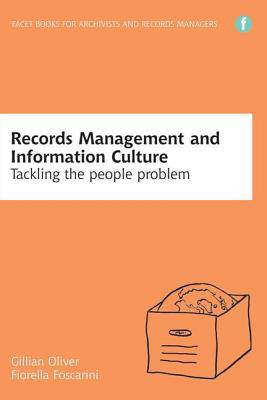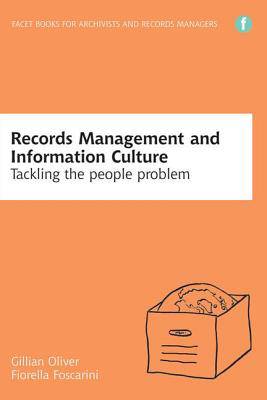
- Afhalen na 1 uur in een winkel met voorraad
- Gratis thuislevering in België vanaf € 30
- Ruim aanbod met 7 miljoen producten
- Afhalen na 1 uur in een winkel met voorraad
- Gratis thuislevering in België vanaf € 30
- Ruim aanbod met 7 miljoen producten
Records Management and Information Culture
Tackling the People Problem
Gillian Oliver, Fiorella FoscariniOmschrijving
This book explores how an understanding of organisational information culture provides the insight necessary for the development and promotion of sound recordkeeping practices.
It details an innovative framework for analysing and assessing information culture, and indicates how to use this knowledge to change behaviour and develop recordkeeping practices that are aligned with the specific characteristics of any workplace. This framework addresses the widely recognised problem of improving organisation-wide compliance with a records management programme by tackling the different aspects that make up the organisations information culture. Discussion of topics at each level of the framework includes strategies and guidelines for assessment, followed by suggestions for next steps: appropriate actions and strategies to influence behavioural change.Key topics covered include:
The value accorded to records
Information preferences
Language considerations and regional technological infrastructure
Information-related competencies
Awareness of environmental requirements relating to records
Corporate information technology governance
Trust in recordkeeping systems.
This book explores how an understanding of organisational information culture provides the insight necessary for the development and promotion of sound recordkeeping practices. It details an innovative framework for analysing and assessing information culture, and indicates how to use this knowledge to change behaviour and develop recordkeeping practices that are aligned with the specific characteristics of any workplace. This framework addresses the widely recognised problem of improving organisation-wide compliance with a records management programme by tackling the different aspects that make up the organisation's information culture. Discussion of topics at each level of the framework includes strategies and guidelines for assessment, followed by suggestions for next steps: appropriate actions and strategies to influence behavioural change. Key topics covered include: background and context; the value accorded to records; information preferences; language considerations and regional technological infrastructure; information-related competencies; awareness of environmental requirements relating to records; corporate information technology governance; trust in recordkeeping systems; bringing it all together. Archivists, records managers and information technology specialists will find this an invaluable guide to improving their practice and solving the 'people problem' of non-compliance with records management programmes. LIS students taking archives and records management modules will also benefit from the application of theory into practice. Records management and information management educators will find the ideas and approaches discussed in this book useful to add an information culture perspective to their curricula.
Specificaties
Betrokkenen
- Auteur(s):
- Uitgeverij:
Inhoud
- Aantal bladzijden:
- 192
- Taal:
- Engels
- Reeks:
Eigenschappen
- Productcode (EAN):
- 9781856049474
- Verschijningsdatum:
- 2/01/2014
- Uitvoering:
- Paperback
- Formaat:
- Trade paperback (VS)
- Afmetingen:
- 155 mm x 231 mm
- Gewicht:
- 276 g

Alleen bij Standaard Boekhandel
Beoordelingen
We publiceren alleen reviews die voldoen aan de voorwaarden voor reviews. Bekijk onze voorwaarden voor reviews.











